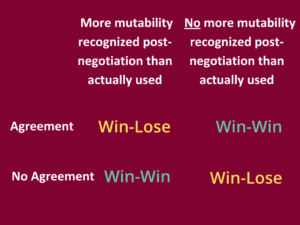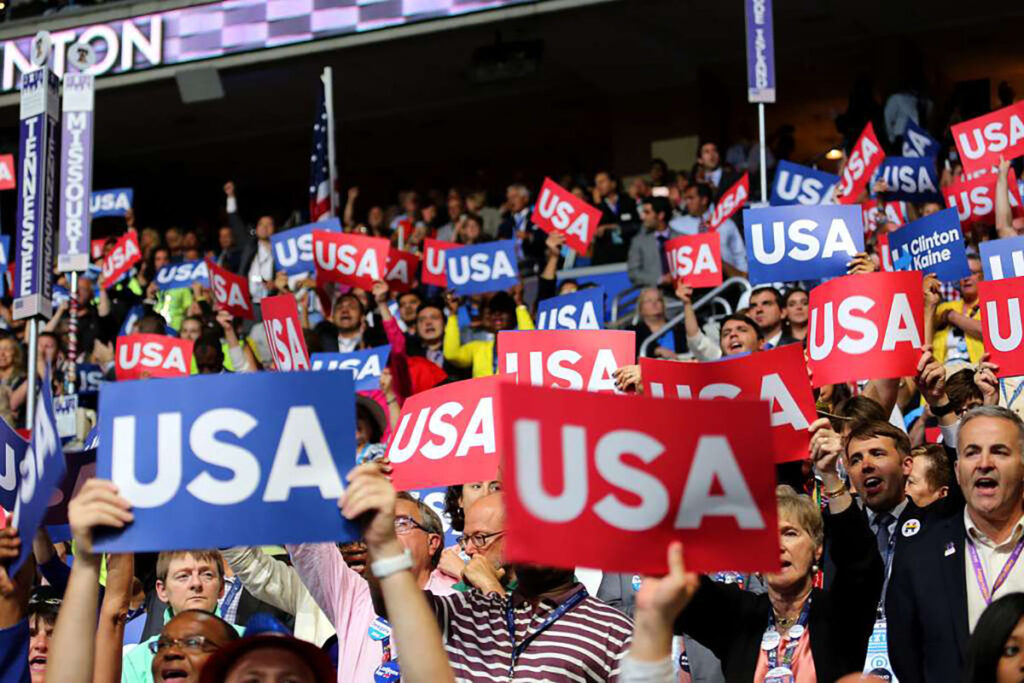By Zekariah McNeal ‘21

The precursor to this post began a discussion for why negotiations are understood to be win-win or win-lose. Analyzing how the pre-agreement and post-agreement perspectives of a negotiator relate to this question, the previous post suggested that determining whether a negotiation is win-win is quite a complex endeavor. Although the terms win-win and win-lose are ubiquitously used to describe negotiations, a close consideration of the terms’ use results in a more precise framework.
Certainly, negotiations that are likely to be considered win-lose will regard some issue that is non-fungible and indivisible, but the negotiator’s perspective determines whether such a negotiation is win-lose. Pre-agreement perspective on such an issue may prime the negotiation to be integrative in style. Post-agreement perspective allows a negotiator to recognize where an integrative approach did not result in value creation throughout the negotiation and to appreciate and respond to the impact of this failure. But perspective alone is not dispositive for whether a negotiation is win-win or win-lose. The mutability of a negotiation’s circumstances also influences the answer to this question. Mutability of circumstances adds to an assessment of a negotiation in both an objective manner and in a subjective manner as it relates to perspective. The more malleable the circumstances surrounding a negotiation, the more likely a negotiator will consider it to be win-win. But even in negotiations with quite fixed circumstances, negotiator perspective can be dispositive for any win-win, win-lose assessment.
The Switchboard
Many negotiations arise when one is met with one of two different situations. First, a negotiation may arise when one does not have the ability to unilaterally accomplish his goals. Second, a negotiation may arise when the better route to accomplish one’s goals would be to partner with a counterparty. These ideas can be explained in relation to the concept of the “Best Alternative to Negotiated Agreement” (BATNA).1
An individual or organization is likely to engage in a negotiation with another entity when its BATNA is a markedly less preferable option or when its BATNA appears to practically be nonexistent. Not only does a BATNA influence whether one enters a negotiation, it also influences one’s negotiating position after entering. In fact, because of a BATNA’s immense influence on a negotiation, one of the most important lessons when studying the subject is that strengthening one’s BATNA is essential. With a strong BATNA, a negotiator has ultimate flexibility to exit a disagreeable negotiation, but a weak BATNA can force the negotiator to settle for whatever agreement their counterparty demands.
This essay will not discuss BATNAs at length because the BATNA concept creates a narrow understanding of a negotiator’s options. A BATNA is the path of choice for a negotiator in the case that there is no deal.2 But before narrowing in on a particular non-agreement path of choice, a negotiator may benefit from considering all options at hand. BATNA arises from a much wider set of capabilities that a negotiator may engage without the participation or assent of the negotiating counterparty.
Imagine that these capabilities are a large switchboard of dials. Each dial represents a choice for the negotiator that does not require the assent of the counterparty. Often this choice is the negotiator’s alone, but it may include the participation of a third party. Examples of such choices include canvassing an array of alternative counterparties, taking some legal action, engaging the public, or appealing to a higher authority within the counterparty’s organization. This list is long, and decisions range from the granular to the expansive. A negotiator’s BATNA is a particular arrangement of these dials that will best serve the interests of the negotiator. Understandably, BATNA is an extremely useful concept for a negotiator to grasp before engaging in a negotiation. It provides opportunity to abandon an agreement and leverage to negotiate the agreement toward a more ideal outcome. But this essay’s focus is the ease with which the dials may be turned and the amount that the dials may turn. This essay will call these important measurements the “mutability of circumstances.”
A negotiator’s relationship to the mutability of circumstances is subsumed in two phenomena. First, some external circumstances that make non-negotiated options less attractive will be objectively immutable, such that the negotiator could not find ways to adjust them. Second, a negotiator will often carry an internal understanding that circumstances are measurably immutable, such that the negotiator will not even attempt to find ways to adjust the circumstances. These phenomena can be denominated as objective mutability and subjective mutability, respectively, and each can have a significant effect on the outcome of a negotiation.
To make these phenomena concrete, consider the switchboard illustration once again. Objective mutability relates to the greasing of each dial, the ease with which the dials may be turned. Limiting factors might include physical or legal constraints that could not be overcome. On the other hand, subjective mutability relates to the willpower, strength, or expertise required for the negotiator to turn the dials. Where one negotiator may see a dead-end in circumstances, another negotiator may recognize an opportunity to alter that circumstance either unilaterally or with the help of a third party.
Objective Mutability
Consider a series of examples that illustrate an increasing amount of objective mutability:
- A chief engineer working on a major project may discover that some pre-construction measurements were incorrect such that part of the structure needs to be reinforced. If the project will not operate effectively without reinforcement and if there is no way to reallocate funds to allow for the reinforcement costs, the chief engineer would need to enter a negotiation with the financing organization in order to increase the budget. Because physics will not entertain negotiation and unilateral alteration of the laws of physics is not available, the circumstances surrounding such a negotiation would be objectively immutable.
- If the same engineer discovered that without high-cost reinforcement the project would still operate but unfortunately would not meet legal code, the engineer would be in similarly immutable circumstances. But here, the engineer would have the option of violating the legal code and constructing the project regardless. Or the engineer might petition the enforcing agency for an exception to the rule. Generally, these circumstances are quite immutable, but some options remain with slim chances of success.
- Suppose this chief engineer had the same problem but had the flexibility to reallocate costs. Here, the engineer may have some difficulty, but the objective immutability of the physical circumstance has been mitigated by the mutability of the economic circumstances. An engineer in such a situation may still enter a negotiation with a financing organization. But the engineer may utilize a unilateral capability to alter the circumstances so that a negotiation is not necessary.
- The chief engineer might also have the option of obtaining financing from a different source. Here, the engineer is not able to unilaterally alter the circumstances of her predicament. But the engineer could engage a third party and foreclose the necessity to renegotiate with the financing organization.
Like dials on a switchboard, each of these capabilities deserves assessment as a negotiator considers how to best arrange them either to carry the ideal BATNA into a negotiation with a financing organization or to walk away from the negotiation altogether. But these capabilities prepare the negotiator in an even more important way. They provide the negotiator with tools to best accomplish goals within a negotiation. Negotiators with more unilateral or third-party options at the outset of a negotiation are more likely to find overlapping interests, discover value-creating options, and reach a satisfying agreement through the negotiation. In these ways, a negotiator with objectively mutable circumstances is poised to find herself in a win-win negotiation.
Subjective Mutability
Objective mutability does not alone capture the ease with which a negotiator may influence the circumstances of a negotiation. Such ease also relates to the negotiator’s likelihood to wield that influence. This essay has introduced this concept as subjective mutability. Another way to understand it is the overlap between perspective and objective mutability.
Certainly, objective mutability of a particular circumstance influences the likelihood that a negotiator will decide to adjust that circumstance to strengthen her position. But a negotiator’s internal perspective and assessment for whether a particular circumstance can or should be adjusted may foreclose the possibility that the negotiator adjusts the circumstance regardless of its objective mutability.
Consider the example of a chief engineer seeking financing once again.
- Physical limitations, such as the requirement to reinforce the engineer’s structure in order of it to be operational, are purely objectively immutable. Even if the engineer had the perspective that this circumstance was malleable, she would eventually realize that it was not and that a negotiation with a financing organization would be required.
- Legal limitations, such as the requirement for the engineer’s project to align with code requirements, involve an amount of subjective mutability. One engineer might understand the circumstances to require her to engage in a negotiation with her financing organization. But another engineer might find a legal violation or a petition for an exception to be acceptable. She might conclude that she does have some unilateral influence on the circumstances.
- In the situation that the engineer has the objective flexibility to reallocate costs, she retains a unilateral way to influence the circumstances of her situation and to strengthen her position in relation to a potential negotiation with a financing organization. But her perspective on her capability is dispositive for whether she would either reallocate costs or discuss that as an option within her negotiation. If she assumed that reallocation of costs was not possible even if it indeed were, she would foreclose her ability to strengthen her position.
- Similarly, a chief engineer considering the option of obtaining financing from a different source may interpret that there is no acceptable source to do so or may assume limitations on her probability of success or the amount of financing that she might obtain. By doing so, this engineer could considerably weaken her position, but an engineer that ascertains opportunity to obtain third-party financing would be in a much stronger position both within and without a negotiation with her original financing source.
Each of these examples of perspective focuses on how perspective affects the mutability of circumstances before an agreement. When such pre-agreement perspective increases the likelihood that a negotiator considers their circumstances to be mutable, the negotiator will take advantage of those mutable circumstances and increase the likelihood that they engage in a win-win negotiation. But post-agreement perspective and, more broadly, post-negotiation perspective on the mutability of circumstances are also useful.
 Upon exit of a negotiation, a negotiator who reached agreement is likely to conclude that the negotiation was win-win if there are few or no circumstances that the negotiator believes she failed to influence to strengthen her position. But if the negotiator recognizes circumstances that she could have used to her benefit and did not, she is more likely to realize squandered value in the negotiation and conclude that the negotiation was win-lose. If a negotiator does not reach agreement and finds unused mutability post-negotiation, she may conclude that the negotiation could have been win-win but was not because she failed to realize the value available from an agreement. If she does not reach agreement but finds that mutability was appropriately utilized, then she would likely conclude that the negotiation was win-lose and that she appropriately avoided an agreement.
Upon exit of a negotiation, a negotiator who reached agreement is likely to conclude that the negotiation was win-win if there are few or no circumstances that the negotiator believes she failed to influence to strengthen her position. But if the negotiator recognizes circumstances that she could have used to her benefit and did not, she is more likely to realize squandered value in the negotiation and conclude that the negotiation was win-lose. If a negotiator does not reach agreement and finds unused mutability post-negotiation, she may conclude that the negotiation could have been win-win but was not because she failed to realize the value available from an agreement. If she does not reach agreement but finds that mutability was appropriately utilized, then she would likely conclude that the negotiation was win-lose and that she appropriately avoided an agreement.
Perspective can indeed increase mutability of circumstances before a negotiator reaches agreement, revealing a wide array of switchboard dial arrangements available to the negotiator. Additionally, perspective can reveal unused mutability of circumstances after a negotiation has consummated or failed. And this new perspective can have implications for the negotiator’s conclusions and actions post-negotiation.
Win-win Negotiations
Understanding the building blocks for win-win negotiations is important for multiple reasons. Certainly, many negotiators would prefer to be engaging regularly in win-win negotiations and avoiding win-lose negotiations. But negotiations are often not easily distinguished as belonging to either category. And the mere satisfaction of a negotiator after completing a negotiation is not an accurate proxy to determine whether the negotiation was win-win. Instead, the negotiator’s perspective before and after negotiation and the mutability of circumstances surrounding the negotiation both answer the query.
These concepts may be assessed before entering a negotiation and after completion to help a negotiator determine whether to enter the negotiation in the first place or whether to return for future negotiations with the counterpart. The assessment may also give a negotiator an understanding for how she might adjust her own perspective or adjust circumstances around the negotiation to make a negotiation more likely to be win-win or to lay the groundwork for future related negotiations to be win-win. With these tools in hand, a negotiator may not only gain a more precise understanding for whether a negotiation was or will be win-win. She may also achieve her objectives more readily by understanding which negotiations to enter, how to make a negotiation more attractive before entering it, how to strengthen her position within the negotiation, and how to best adjust her circumstances after a negotiation.
1. James K. Sebenius, BATNAs in Negotiation: Common Errors and Three Kinds of “No,” 33 Negotiation J. 89, 90 (2017) (“Your BATNA is . . . the course of action that you would take rather than ultimately accepting a proposed deal in the talks at hand.”)
2. Id.









